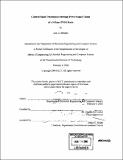Control signal transmission through power supply cables of a 3-phase PWM motor
Author(s)
Mendez, Jose A. (Jose Antonio Mendez Alcazar)
DownloadFull printable version (15.37Mb)
Other Contributors
Massachusetts Institute of Technology. Dept. of Electrical Engineering and Computer Science.
Advisor
Chatham M. Cooke.
Terms of use
Metadata
Show full item recordAbstract
Modem process control systems often employ accurate position or speed controlled PWM motors, which require feedback data for the drive control loop. Current methods require an independently shielded cable for feedback data transmission. This is due to the fact that high-voltage PWM signals could easily interfere with the feedback signals, which are typically one or more orders of magnitude smaller than typical PWM signals. We propose a "zero-wire" solution, in which the additional feedback cable used is eliminated, and the feedback data is sent simultaneously with the PWM signals in the same motor power conductors. In this study, we first analyzed the characteristics of typical feedback and PWM signals. Additionally, a standard representative motor drive cable was carefully measured and analyzed for its wave transport characteristics. The results lead us to select an RF modulation approach in which we modulate the data signals to 900MHz. The data signals are injected and extracted from the power conductors using feed-through capacitors and high-pass filters. To test the performance of our approach, we build a model system in which simulated PWM signals were applied to a 30m motor power cable fitted with data couplers and 900MHz RF RS232 data modems for modulation. (cont.) Tests with different cables and attenuation were performed and data error rates measured. The error rates for strong RF signals, RSSI (Received Signal Strength Indicator) values higher than -60dBm, were limited by RF modem performance to 0.01%. Error rates did not increase with or without PWM power signals when RSSI values were over -80dBm. A design for transmission of DC power for motor feedback electronics is presented, in which we choose an intermediate frequency carrier at 1MHz to transmit power. The 1MHz signals are injected and extracted through the same feed-through capacitors using band-pass filters. Measurements and simulation have shown that the new feedback data transport system design developed in this project is effective and feasible.
Description
Thesis (M. Eng.)--Massachusetts Institute of Technology, Dept. of Electrical Engineering and Computer Science, 2006. Includes bibliographical references (p. 147-148).
Date issued
2006Department
Massachusetts Institute of Technology. Department of Electrical Engineering and Computer SciencePublisher
Massachusetts Institute of Technology
Keywords
Electrical Engineering and Computer Science.